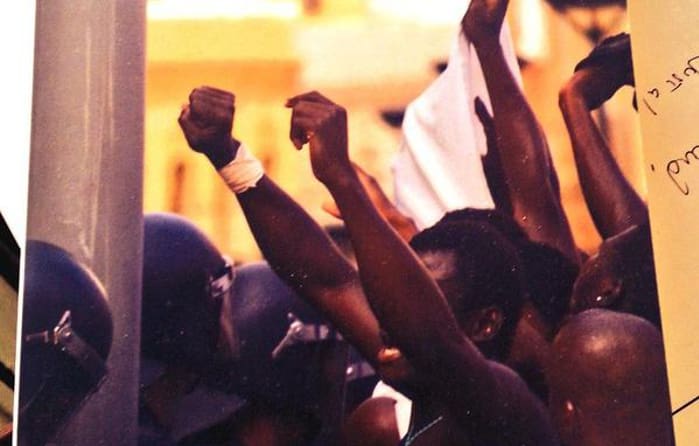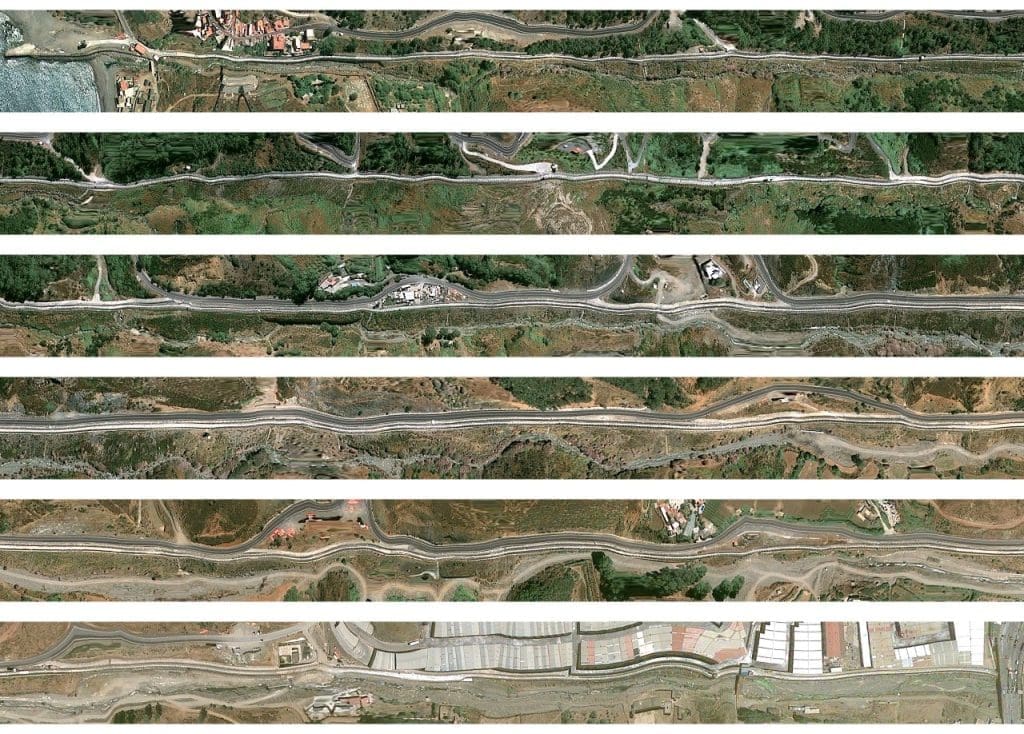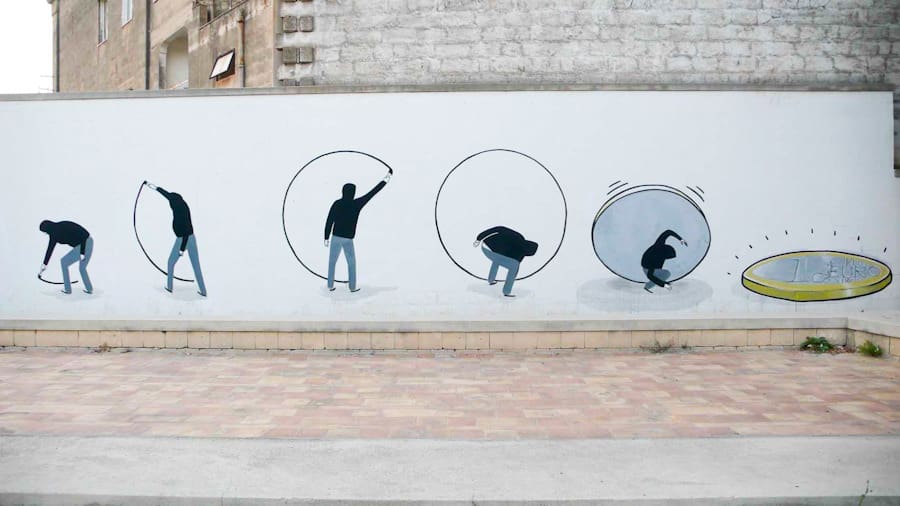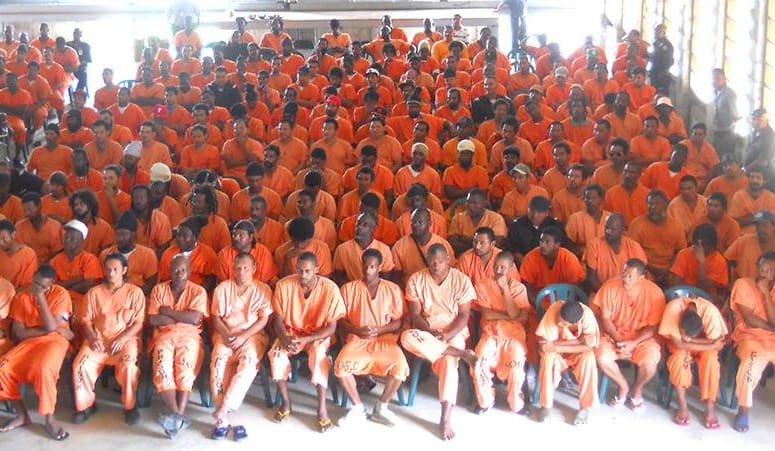Transcribed from the 9 May 2015 episode of This is Hell! Radio and printed with permission. Edited for space and readability. Listen to the full interview:
“We see abstract numbers in the news; we hear about thousands of people at our borders. We very rarely listen to their stories and understand what they’ve gone through, how they are thinking, what calculations they are making. Often they are very brave people. Always, actually.”
Chuck Mertz: Europe has created a living hell on the high seas of the Mediterranean that has claimed the lives of people who are desperately fleeing misery for the slim chance at a better life. That is, if they survive the trip. Here to tell us how we got to this hell, anthropologist Ruben Andersson is author of Illegality, Inc.: Clandestine Migration and the Business of Bordering Europe.
Ruben recently posted the article Destroy the Smuggling Market, Not the Boats at IRIN News, a website that had done award-winning news coverage for the UN for nineteen years, but has just recently become an independent non-profit media organization. Ruben Andersson is also based at the London School of Economics and Political Science, where he is a post-doctoral researcher at LSE’s Civil Society and Human Security Research Unit, and an associated researcher at Stockholm University’s department of anthropology.
First let’s get to the news this week regarding illegal migration to Europe. CNN reported, “Dozens of migrants are feared to have drowned this past Sunday after falling from a boat into the Mediterranean Sea, the aid organization Save the Children said Tuesday. The report is one of many describing migrants dying at sea. Thousands of people are leaving North Africa every month aboard crowded vessels to escape desperate conditions and reach European shores. The coast guard said that between Friday and Tuesday, 8,300 migrants had been saved. Italy’s coast guard said that more than 3,400 migrants were saved in sixteen operations off Libya’s coast on Saturday alone. As of mid-April, more than 1,700 people had died or gone missing this year in the sea that touches Europe, North Africa, and the Middle East, according to the UN Refugee Agency. But tens of thousands more migrants have reached Europe by crossing the Mediterranean. Some 36,390 people managed to reach Italy, Greece, and Malta in the first few months of 2015, an agency spokeswoman, Melissa Fleming, said last month.”
Why is this happening now, Ruben? Or is this something that has been happening for a very long time but it’s only now getting attention because of the deaths on the high seas?
Ruben Andersson: Right now—for the last couple of years, really—the scale of the crisis in the Mediterranean has been quite unprecedented. The chaos in Libya has really taken hold, with a lot of repression, violence and difficulties faced by migrants in Libya contributing to the push, contributing to these departures.
But it’s not the first crisis in the Mediterranean. It’s been going on now, on and off, for the last couple of decades, since Europe started closing its common external borders. It’s a fairly recent historical development that’s grown and grown every year, and has now reached a stage where a lot of politicians, journalists and policy makers are really taking notice. But it’s become a regular feature of the European summer season for the past few years.
CM: I have seen Europe’s foreign policy in North Africa and the Middle East being given as the reason for the exodus of people from those regions to Europe. How much is Europe’s foreign policy to blame for the mass-migration of people from Africa to Europe?
RA: Europe’s foreign policy is only a small part of the puzzle, really. Europe has not done enough on Syria; also, we’ve seen what’s happening in Libya now after the fall of Qaddafi—a downward spiral of violence and conflict, with very little responsibility being taken in European capitals, among NATO members, for what’s going on there.
But I think that’s only one part of the puzzle here. The border policies themselves are contributing to what’s going on: the strengthening of border patrols leading to ever more dangerous routes being used into Europe; land routes being closed, pushing people onto the sea route, and so forth. And each tragedy means even more reinforcements. It’s not just about foreign policy. We also have to look at the border policies, the type of migration controls they’ve put in place in Europe.
Here we can see a parallel in the United States, with similar types of control at the southern border not really addressing the issue but in fact often making the problem worse. That’s what’s been happening in the Mediterranean.
CM: In your column at IRIN News a couple weeks ago, Destroy the Smuggling Market Not the Boats, you wrote, “Migration loot lined the wall of the Red Cross hangar on Gran Canaria. It was springtime five years ago when my humanitarian host showed off row after row of gleaming red forty-horsepower Yamahas, confiscated from the large wooden fishing canoes that once brought willing workers from faraway West Africa to the Canary Islands. Looking back from our death-stricken present, I now see these migrant motors as souvenirs from a more innocent era in Europe’s futile fight against illegal migration and as keys to understanding why the latest desperate bid to stop it is doomed to fail.”
When you say the latest desperate bid to stop illegal migration to Europe is doomed to fail, do you mean fail to stop illegal migration completely, or fail to slow illegal migration? Do you think that whatever the plan is in Europe, it will at least slow illegal migration to Europe? And is that what the real plan is?
RA: First just a quick note on terminology: we often hear the word “illegal migration”—it should really have scare quotes around it. What we’re seeing is refugee flows in the Mediterranean. We should recall that most of these people are fleeing conflict. They are in need of international protection.
But anyhow, as for the policies themselves and the bid to stop the refugee flows: often the ones who are the first to acknowledge that we can’t really halt migration are the border guards themselves. During my long field work on migration (looking especially at Spain, who were really quite successful for a few years in slowing the flow of migrants across their land and sea borders from Africa), the border guards themselves were saying migration is something that can never be stopped.
We can only—as you say—perhaps slow it down, they said. We can shift the routes around for a few years, but that’s pretty much all we can do. There’s nothing that “we”—as border guards—can actually fight. So the terminology itself is incorrect: “fighting illegal migration” is an impossible prospect in the long run.
What you can do, of course—as Australia has done, for instance—is you can shift the routes around. You can push people away from a certain section of the border. Australia has done that quite successfully along its maritime northern border with Southeast Asia—but instead the people trying to use that route are now instead drifting towards their own “Mediterranean,” as it were, forced into dangerous detours.
So it’s on a global scale that we’re seeing shifting routes across different bits of the borders of the rich world—and specifically the borders of the West—in response to border controls. The flows of people are just being pushed around, they are not being reduced.
And what they are doing besides that is adding to the danger, adding to the risks, making the journey more and more difficult and more and more dangerous. We’re strengthening the smuggling markets, because as you keep controlling borders more and more, you create a market for getting across them in a clandestine manner.
So we’re not really addressing the problem. We’re just shifting it around a bit for a few years, a few months. Hoping for the best, we might keep it out of the news for a bit, but then it will come back again with a vengeance, and that’s what we’re seeing now.
CM: As you were pointing out, these are people who are trying to get into Australia, people trying to get into the US, or, as we’re seeing on the Mediterranean, people trying to get into Europe. Can we blame this all on some growth in global wealth disparity between the West and the rest of the world?
RA: No, I don’t think we can. Obviously that’s part of the picture here. The disparities in global wealth are hugely significant. But it’s not the sole reason behind these flows. What we’re seeing now in the Mediterranean is people fleeing conflicts. The conflict in Syria is leading to millions of people seeking shelter in neighboring countries, with Lebanon taking over a million Syrian refugees. Huge numbers. This is because of conflict and persecution.
Similarly, another big nationality among the Mediterranean arrivals right now is Eritreans. The repression in Eritrea has quite some attention lately. And the chaos in Libya and the ongoing conflict there are contributing to a northward push of West African migrants, for instance, who were living there (Libya has long been a big migrant destination, we tend to forget that). They are now facing attacks; they are now facing arbitrary detention; they are now facing violence in the streets. So they are taking to the boats. We also need to look at the violence behind many of these movements.
“The policy has completely failed. It was an attempt at ‘deterrence’ of sorts—and it turned out to be a very brutal sort.”
And we should also recall that often the people who set out on these routes are not the poorest of the poor. Like I mentioned with the case of Lebanon, most refugees (and also most migrants) stay within their own region. West Africa, for instance, which is the area I’ve looked at quite closely: most West African migrants stay within their own region. They travel across regional borders and work and so on, and that’s the end of it. We never hear about them in the news stories. We only hear about the small fraction arriving in Europe. They are the ones that have at least some kind of resources; they have some family funds, perhaps; they have a bit of education. They are not at the bottom of the wealth pile, in that sense.
We need to remember that even if you are a refugee, you also need a livelihood. If you arrive in a place where there’s absolutely no future for you and your family—economically, socially, or in any sense—well, of course you will then seek to move on.
People often have very complex motivations for moving, and we often forget about that. We see these abstract numbers in the news; we hear about thousands of people at our borders. We very rarely listen to their stories and understand what they’ve gone through, how they are thinking, what calculations they are making.
Often they are very brave people. Always, I would say. They know what they are getting into. And they think the risk is worth taking, because what they are running from is often much worse, as is the case now in Libya.
CM: In your article at IRIN News, you write, “‘Stop the boats, destroy them and attack the smugglers, and so halt the refugees for their own good.’ This is now one of our politicians’ main messages, faced with the mass deaths resulting from their refusal to continue Italy’s sea rescue campaign of 2014 that saved so many lives.”
Why did that sea rescue campaign stop?
RA: It’s largely because of political motivations. Often we hear that the Italian navy was not prepared to shoulder the costs of this operation—about 9 million euros a month—to save people further off Italian shores, also close to Libya’s coast, where people were setting off in these rusty, overloaded vessels for the Italian island of Lampedusa or the Italian mainland.
Many governments in Europe argued that these rescues carried out by the Italian navy were a “pull factor.” They said they were inadvertently attracting people to take the risk of the journey because they knew they would be saved as they set off. This was a pretty big gamble on the part of politicians.
So we had a replacement, led by the EU border agency, Frontex. Much smaller, only patrolling very close to the Italian coast. And numbers have not fallen. In fact, they’ve grown. And the death rate of the journey, the actual fatalities, the drownings we’ve been hearing about, are way higher so far in 2015 than they were in the first months of 2014.
So basically the policy has completely failed. It was an attempt at “deterrence” of sorts—and it turned out to be a very brutal sort.
We’ve had an about-face since these last tragedies. They are now, again, pouring resources into rescues—but still under the EU border agency Frontex. And on paper it’s not a rescue operation. It’s a border control operation that will carry out more rescues. That’s part of the new policy.
And another part of the policy, as you read there, is to destroy smugglers’ boats. That’s making me and many other observers very worried. First of all it’s going to be very difficult, legally and practically; the discussion is ongoing in the Security Council in New York. But besides that, simply targeting vessels in this very simplistic and militaristic manner will do absolutely nothing to reduce the market as such, the demand for these journeys. People are still seeking to flee.
We’re going to end up with even more precarious vessels being used; we’re going to end up with even more difficult routes being embarked on to avoid these new controls. We’re creating more risk.
CM: In Europe, why are migrants so reviled? Is it the same story as here in the US, about “those people” taking our jobs, hurting our economy, getting on welfare, using our services they don’t pay for, and who are a threat to our culture? Is it the same in Europe?
RA: Yes, it’s the same story. Of course there’s austerity in Europe as well; living standards in many places have fallen; life is getting more difficult in many parts of Europe. Of course we have an easy scapegoat in these non-European migrants arriving in this spectacular manner from across the Mediterranean.
So yes, we have a very similar type of dynamic going on here, and a rise of nationalist and far-right parties across the continent. That’s a political reason why we are not seeing any meaningful changes on the European level in terms of the policy. We know that the types of border controls we have now are failing. But politicians cannot see beyond them, partly because of the political pressure. They know they have to be seen to be doing something to stop these flows, even though that “something” is not working.
It’s a very destructive dynamic, and very few politicians actually dare take on the debate. But part of that debate should be to realize that only a very small minority of migrants in Europe in fact arrive over the seas. Yes, the numbers have been rising over the past couple of years because of these conflicts, but they are still very small in comparison to overall migrant numbers in Europe.
And they’re certainly very small in comparison to global refugee numbers. Almost nine out of ten of the world’s people fleeing conflict and persecution are hosted by developing nations, not by a Western state. We have a very distorted idea of the responsibility we are taking in Europe for refugee hosting.
CM: One of our show’s correspondents suggested in an email that we talk with you about Frontex, which he described as a “strange, amorphous, violent, unaccountable thing operating independently of any singular or collective state authority.”
Does Europe have a migration control system that exists outside of any oversight or what we might see as democratic checks and balances?
“This market only exists because of the type of border controls we have. The more we strengthen these types of controls, the stronger we’re going to make this market, and the stronger the hold of smuggling rings on their ‘customer base’ will be.”
RA: Well, Frontex is the EU border agency. It’s an official EU agency, where member states participate. So there is a level of oversight in that sense. It’s a collective European endeavor in coordinating border controls in the so-called fight against irregular migration.
So they exist within this European political system, but until recently they are very far from the public political debate in member states. Very few people know about it; very few people are aware of what’s going on in border controls.
And that’s similarly the case for many of the tech systems that they have rolled out over the past decade. One example is the so-called European External Border Surveillance System, a hugely ambitious attempt to create a system through which all security forces in Europe—or many of them—can talk to each other and see what’s going on at the borders. This has been rolled out in collaboration with industry, over many years, with very little political scrutiny.
Often these initiatives just kind of appear. They go through a lot of very technical processes, far from the public eye and with very little political debate in Europe, and then we are stuck with them. Suddenly we just have these systems that have been created by “experts” of all kinds with very little political debate behind them.
We should also remember that member states are still the ones in the driver’s seat in terms of European border control. Often it’s been Spain or Italy who have been calling the shots. They’ve been creating collaboration agreements with neighboring states, and policing the borders in a very destructive and dangerous manner, such as the case between Italy and Qaddafi before his fall where push-backs of boats were organized, as well as prolonged detention and human rights abuses of migrants in Libya, and so on and so forth.
There again, we have very little political oversight. There’s very little transparency in any of this. It goes on outside the public eye.
CM: You write, “Our politicians keep talking about unscrupulous traffickers, insinuating that migrants and refugees are passive victims. But people forced to move are creative, resourceful, and anything but stupid. Most refugees and migrants know about the risks, yet still they embark rusty vessels, since staying behind is either more deadly, as in Syria, or a recipe for wanton incarceration and endless desperation, as in chaos-ridden Libya.
How much of this “unscrupulous traffickers” and “passive victim migrants” narrative do you think is based in racism?
RA: That’s very hard to tell. I think it’s more a case of simply wanting to have a scapegoat. Politicians want to be seen as targeting these unscrupulous smugglers and traffickers, not the migrants themselves.
That’s part of the story I didn’t mention before when we talked about the perception of migration in Europe. There’s also a lot of sympathy. We shouldn’t forget, a lot of people do sympathize; a lot of people even help along European coasts as people arrive. So politicians don’t really want to be seen as targeting migrants themselves. Smugglers are the category of person that is much easier to see as a scapegoat.
And in Libya and around the eastern Mediterranean, very unscrupulous rings are indeed gaining a foothold in this market, and really are abusing migrants and refugees. And abusing the fact that these migrants and refugees are often captive; they cannot leave. They are stuck between persecution and these boats.
There are extortionist prices. People might get locked into compartments on these boats (this often happens to black Africans, so there is certainly a race element, as well as an economic element because they pay less for the journey). We are seeing a highly criminalized network gaining very strong power in this market.
But this market only exists because of the type of border controls we have. The more we strengthen these types of controls, the stronger we’re going to make this market, and the stronger the hold of these smuggling rings on their “customer base” will be. So strengthening these border controls even more is not going to help solve this problem at all.
CM: My next question was going to be who benefits from this, and I know it’s not just merely the smugglers themselves. You even mention how aid agencies can benefit from this. So other than the smugglers or the governments and the people who are taking bribes—who else benefits from this situation?
RA: There have been a lot of sectors that in recent years have come to engage in the border crisis in southern Europe by providing services, solutions, technologies and so on, and making irregular migration into a source of income or influence or what have you.
Besides those parties you just mentioned, there is the defense industry developing new technologies for border surveillance (or fences, as is the case in Spain’s enclaves in North Africa, for instance) or other technologies, sensory programs to scan the coast or monitor migrant boats—and ideally contribute to halting their movement. Which, as I mentioned before, is well nigh impossible in the long run.
Of course security forces also benefit, and not just in terms of taking bribes. We should remember that since Europe has put so much effort into halting this type of maritime migration (despite the fact that it’s not that significant statistically), we created a very negative dynamic with neighboring states in North Africa and West Africa and elsewhere, that are in turn starting to use migration as a bargaining chip in their relations with Europe. Their security forces can see controlling migration as a source of income and a pressure point on Europe in trade negotiations, perhaps, or in diplomatic relations, talks over aid, or in other arrangements.
These are just some examples. But we created a whole set of very entrenched and negative dynamics around controlling migration by seeing migration as a perpetual emergency requiring a policing response instead of trying to normalize it, trying to manage it, trying to understand in a rational manner what’s going on here with these cross-border flows.
CM: In your book Illegality, Inc.: Clandestine Migration and the Business of Bordering Europe, you write that “the European response to ‘illegal’ African migration has sparked conflicts and contradictions that speak volumes about rich countries’ relations with their southern neighbors.”
In what way has the European response to “illegal” African migration sparked conflicts?
“There is a very counterproductive type of border control being put in place across the rich world’s borders, on a global scale. It’s leading to a lot of suffering and misery. There are much better ways to organize globalization. We still haven’t even begun to look at that in a politically engaged manner in much of the rich world.”
RA: There is a lot of conflict in the sense of conflict over priorities, political tension. We saw a diplomatic conflict between Libya and Europe around these migratory flows in the Qaddafi years, for instance, when he asked Europe for billions of euros in order to “stop the continent from turning black.” He was, in the most blatant manner, challenging Europe to cough up money to control sub-Saharan migrants before they embarked for Europe.
We’ve seen it elsewhere, as well. For instance in Morocco last year, over a span of about two days, suddenly the sea border was open. There were no controls across the sea, and suddenly a lot of very small vessels packed with migrants came across the Strait of Gibraltar. Then, of course, there was panic in Madrid, and agreements were hastily reached to put border controls in place again. So there’s a very high political game going on here in using migratory pressure in different ways to extract concessions.
But this has also created tensions within the countries who are collaborating with Europe. They are often settled with migrant populations that might not want to move on—who now seem problematic when they weren’t so before. As I mentioned before, Libya had been a destination country for sub-Saharan migrants over the last decade or so, but migrants are now suddenly starting to be seen as a security problem. That creates even more tension within the country.
So we should be trying to do something quite different in seeking to lessen the tragedies in the Mediterranean: normalize migration. We should try to see that we’ve had these types of cross-border flows for a long time; we can expect these flows to exist at a time of globalization; and we should try to find a way of normalizing this situation rather than ratcheting up the pressure and creating this emergency.
CM: You write, “Beyond the crisis and its scapegoats, more is at stake, too. In assessing rich states’ efforts to shut out the unwanted, these efforts bring into stark relief the uneven distribution of mobility under globalization. Moreover, they shine a light on the role of movement and our understanding of what it means to be a fulfilled, rights-bearing human being. In our high-speed world of resurgent international borders, mobility is paradoxically becoming both a privilege and a stigma.”
Can globalization offer an even distribution of mobility? Or does it inherently create the kind of inequality that can be one of the components leading to the crisis that we’re seeing?
RA: I don’t think globalization inherently does anything. It’s a very big concept. We really have to bring it back to what type of globalization we’re seeing. We really need to reassess the role of movement under globalization. What we have now, instead of the movement of people corresponding to the movement of goods and capital, is a globalized border business.
There is a very counterproductive type of border control being put in place across the rich world’s borders, on a global scale. It’s leading to a lot of suffering and misery. I think there are much better ways to organize globalization. There are certainly many alternative ways of globalizing flows across the contemporary world, including the flows of people across borders. We still haven’t even begun to look at that in a politically engaged manner in much of the rich world.
CM: Ruben, one last question for you, and as we do with each and every one of our guests, it’s the Question from Hell: the question we hate to ask, you might hate to answer, or our audience is going to hate the response.
You write that “the term ‘illegal immigrant’ used in this book as a popular or folk term is pejorative, stigmatizing, and even incorrect, implying as it does that migrants are criminals when they have usually only committed an administrative infraction.”
How is it inaccurate? I mean, if you are doing something illegal, doesn’t that make you a criminal?
RA: In most jurisdictions, migrating without your papers in order is an administrative offense. You cannot go to prison for it. You will be put into some type of administrative facility—often just as punitive as a prison, I should say—but with a different set of rules, a different set of regulations. You’re not a criminal in the criminal justice sense. Then, of course, you can be deported, which is another part of the puzzle there.
But besides the problem with the term “illegal” implying that you’re a criminal, it is applied as a modifier to a noun we should also examine. An “immigrant” is what you are 24 hours a day. It’s an identity category. So we’re calling certain types of people “illegal,” effectively branding their whole person illegal. It’s highly stigmatizing, and there are campaigns across Europe to stop using this term. Even the European Commission has been pushing for using the term irregular migration.
Also by using this very clear-cut terminology—illegal or legal; you’re out or you’re in—we forget that people often have very complex stories. Some people may have registered with the local authorities. Some people may have applied for asylum but are still being put through the paces of migration control.
So it’s a category that’s ill-suited, analytically, to this phenomenon. It’s also ill-suited morally, in labeling people in a way that’s highly problematic and stigmatizing.
CM: Ruben, thanks so much for being on our show. I truly appreciate it. Great to talk to you.
RA: Thanks to you.





